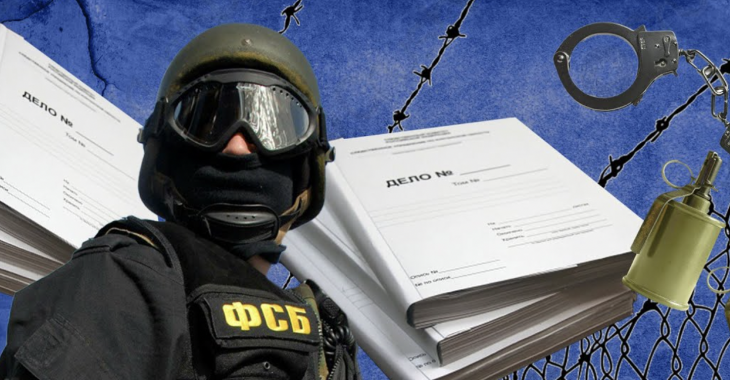
Russia’s State Duma has adopted in full a draft bill which dangerously extends Russia’s legislative arsenal against Ukrainians and other foreign nationals who oppose its war of aggression and support liberation of Russian-occupied Ukrainian territory.
The bill, introducing amendments to Russia’s criminal code with respect to ‘state treason’; ‘spying’ and ‘armed rebellions’, was adopted in both its second and third readings on 17 December 2024. It is now only a matter of time before Russian leader Vladimir Putin signs it into law.
A new criminal charge is introduced, under Article 276.1 of Russia’s criminal code, for supposedly ‘providing assistance to the enemy / adversary [in Russian: противник] in activities knowingly directed against the security of the Russian Federation’.
This presumably refers to any help to Ukraine in defending itself against Russia’s full-scale invasion, as well as all support for the liberation (de-occupation) of Ukrainian territory currently under Russian occupation. The charge envisages a sentence of from 10 to 15 years, as well as a steep fine (500 thousand roubles or three years of the defendant’s salary or wages). The bill will apply to any foreign nationals or stateless persons who from “Russian territory” provide financial, material-technical, consultative and other assistance to “the enemy”
The first danger is not specific to these amendments. There are huge parts of what Russia is claiming to be ‘Russian territory’ that are nothing of the kind, but are Ukrainian territory under occupation.
The bill, however, significantly broadens the already existing possibilities for repression, including through the widened scope of who or what is understood by the term the enemy / adversary. This can be a foreign state, but it can also refer to international or foreign organizations deemed to “directly counter Russia in the armed conflict”. How widely this is interpreted remains to be seen with respect to other foreign states. As far as occupied Ukraine is concerned, Ukrainians found to have worked for voluntary organizations, etc., will very likely be in danger.
The charge of ‘state treason’ is now no longer confined only to Russian citizens but can be brought against foreign nationals and stateless persons. ‘Treason’ will, furthermore, be interpreted much more broadly, with charges potentially brought, ot only for financing “Russia’s enemy”, or taking part in military action on this ‘enemy’s’ side, but also “voluntarily entering the service or work in other bodies and organization’s carrying out activities directed against the Russian Federation’s security”. Russia’s propaganda machine standardly tries to justify the full-scale invasion of Ukraine and occupation of Ukrainian territory as Russia ‘defending’ itself against threats to its ‘security’.
Once this new bill comes into force, Ukrainians on occupied territory can still be charged with ‘treason’ or with so-called “cooperation on a confidential basis with a foreign state, international or foreign organization” (under Article 276.1). even if they have resisted Russia’s coercive measures and not taken Russian citizenship.
in its earlier analysis of the amendments, Pyervy Otdel [First Department] pointed out that the broadening of interpretation of ‘crimes against state security’ in general, and ‘state treason’, ‘spying’ and ‘armed rebellion’ in particular, could lead to an increase in the number of such prosecutions.
Perhaps the most dangerous innovation, Pyervy Otdel says, is the fact that ‘going over to the side of the enemy’ will not just be viewed as direct participation in military action. It will also include “voluntary participation in the activities of the authorities, institutions, business, or organizations of the enemy, knowingly directed against the Russian Federation’s security”. If, up till now, just prosecutions have mainly been linked with alleged involvement in, for example, the Free Russia Legion, now any cooperation with Ukrainian organizations which Russia views as ‘dangerous’ could lead to a person facing ‘treason’ charges.
Pyervy Otdel warns of the likely misuse of the terminology used here of “involvement in the activities’, with such misuse already seen in prosecutions over so-called ‘undesirable organizations’ or ‘extremism’. In practice, anything can be called ‘involvement in the activities’, including reposting material; taking part in conferences; providing financial services, etc.
The bill also stipulates that there can be no early conditional release for any charges involving either ‘terrorism’ or ‘armed rebellion’. This is in principle very dangerous given that Russia is using its flawed ‘terrorism’ legislation as a weapon against Crimean Tatar and other political prisoners, with such charges increasingly applied on territory seized since the full-scale invasion of Ukraine. In practice, it probably changes little as not one Ukrainian political prisoner has been released even a day early, unless as a part of an inter-state exchange of prisoners.
In fact, as far as practice is concerned, Russian lawlessness on occupied Ukrainian territory has known few limits. With respect to those Ukrainian civilians abducted by the invaders from occupied territory whose imprisonment Russia finally acknowledges, and who end up facing fake ‘trials’, the sizes of the sentences have varied very little, whether a person with only Ukrainian citizenship was accused of ‘spying’ under Article 276 of Russia’s criminal code, or with Russian citizenship – under Article 275 (state treason).
That does not change the evident danger in any broadening of already abused legislative norms. There has been a huge increase in convictions for supposed ‘treason’ and ‘spying’ since Russia launched its full-scale invasion of Ukraine. Yevgeny Smirnov, lawyer for Pyervy Otdel fears that the new amendments will lead to many times more such prosecutions and horrific sentences.
See also: Legislators equate criticism of Russia's war against Ukraine with ‘terrorism and extremism’


